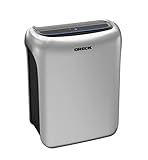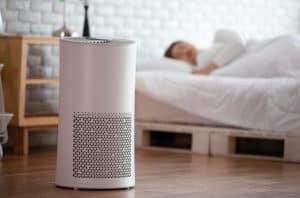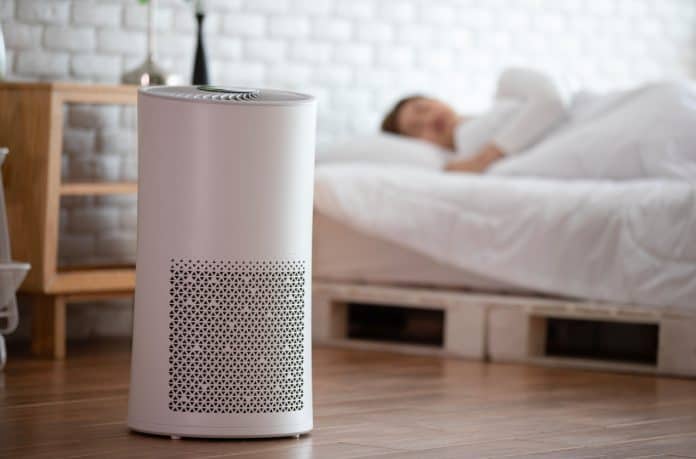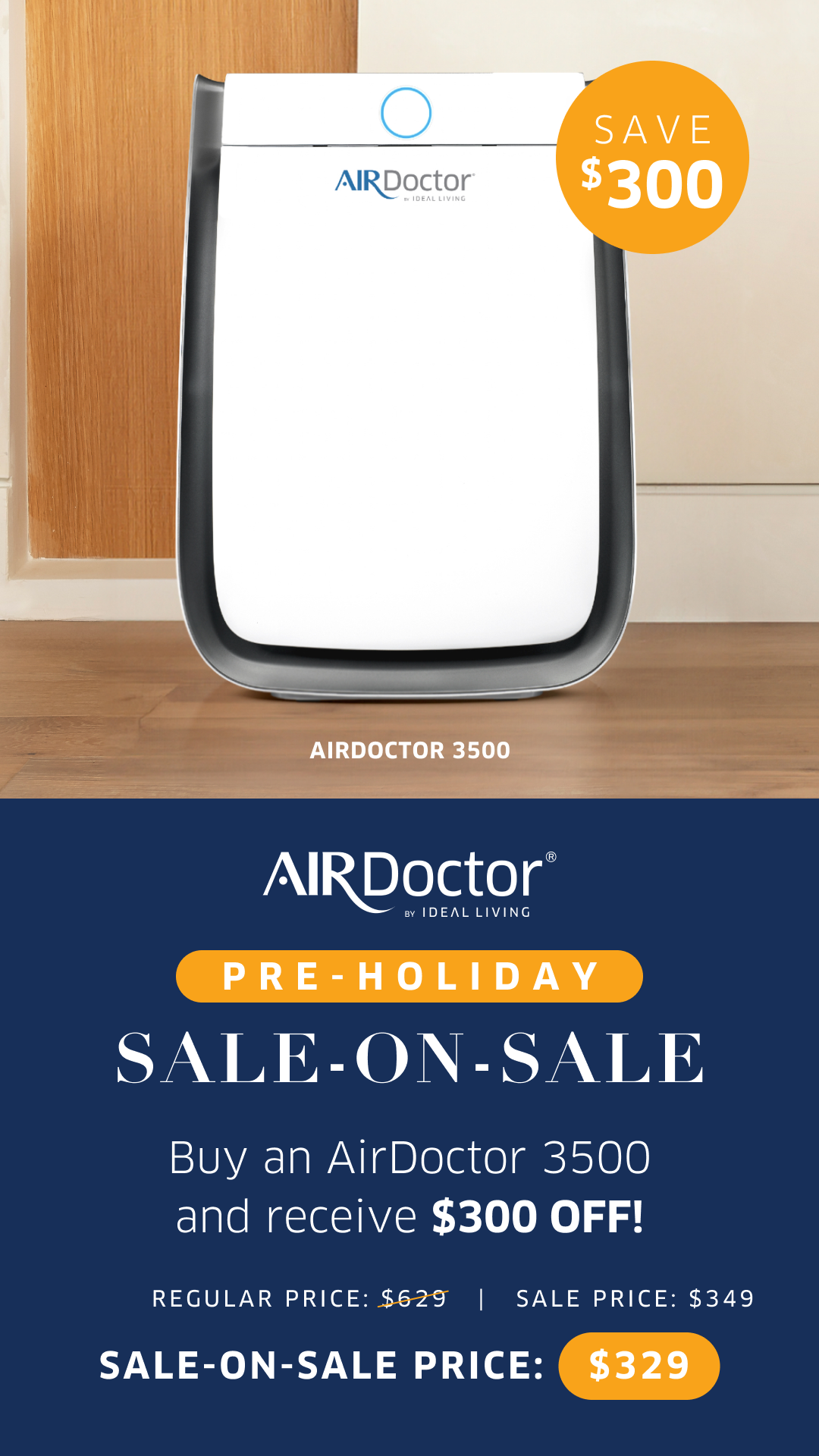Nowadays, the important question that is being asked daily is that, is Air purifier necessary, and should you sleep with the air purifier on?
Air purifier moves you to your comfort zone of sleep by keeping the air clean. The most important thing for every human being is sleep. When sleep is not proper, we will be falling into many disorders at a later stage.
The Role of Air Purifiers
Air purifiers function by filtering out pollutants, allergens, and other harmful particles from the air, creating a cleaner and healthier environment. They are especially beneficial in urban areas where air quality is often compromised due to pollution, industrial activities, and high traffic volumes. By removing these contaminants, air purifiers can significantly improve indoor air quality, making breathing easier and reducing the risk of respiratory issues.
The Importance of Clean Air for Sleep
Sleep is a critical component of overall health and well-being. It is during sleep that the body undergoes essential processes such as tissue repair, memory consolidation, and the release of hormones that regulate growth and appetite. Poor sleep quality can lead to a host of health problems, including weakened immune function, weight gain, and increased risk of chronic diseases such as hypertension and diabetes.
Clean air plays a vital role in ensuring good sleep quality. Pollutants like dust, pollen, pet dander, and volatile organic compounds (VOCs) can irritate the respiratory system, leading to conditions such as allergies and asthma. These conditions can disrupt sleep, causing frequent awakenings and poor sleep continuity. By using an air purifier, you can remove these irritants from your bedroom, creating a more conducive environment for restful sleep.
Should You Sleep with the Air Purifier On?
Running an air purifier while you sleep can offer several benefits. Firstly, it ensures a continuous supply of clean air throughout the night, reducing the likelihood of nighttime allergies and asthma attacks. This can lead to more uninterrupted sleep and better overall sleep quality. Secondly, many modern air purifiers operate quietly, so they won’t disturb your sleep. In fact, the gentle hum of an air purifier can even act as white noise, which some people find soothing and helpful for falling asleep.
Furthermore, air purifiers can help in regulating humidity levels. Some advanced models come with built-in humidifiers that maintain optimal humidity, preventing the air from becoming too dry. This can be particularly beneficial during the winter months when indoor air tends to be drier, causing dry skin, throat irritation, and other discomforts that can disrupt sleep.
Sleep is the most important factor for physical and mental relaxation for the body, mind, heart, brain, and general health.
| Buy Now |  | Oreck | PrimeEligible | |
| Buy Now |  | Blueair | PrimeEligible | |
| Buy Now |  | Blueair | PrimeEligible | |
| Buy Now |  | AIRDOCTOR | PrimeEligible |
Table of Contents
What Does an Air Purifier Do?
The main job of the Air purifier is to filter all the dust particles and help in clean air-breathing. An air purifier is a device designed to filter out dust particles and other contaminants from the air, ensuring cleaner, healthier air for breathing. Its primary function is to remove gas pollutants, allergens, and ultrafine particles, thereby significantly improving indoor air quality.
How Air Purifiers Work
Air purifiers operate by drawing in air from the surrounding environment, passing it through various filters, and then releasing purified air back into the room. These devices typically use a combination of filters, including:
- HEPA Filters: High-Efficiency Particulate Air (HEPA) filters capture particles as small as 0.3 microns, including dust, pollen, mold spores, and pet dander.
- Activated Carbon Filters: These filters absorb gas pollutants and odors, such as volatile organic compounds (VOCs) from paint fumes, smoke, and kitchen odors.
- Pre-Filters: These catch larger particles like hair and dust, extending the life of the HEPA and activated carbon filters.
- UV Light: Some air purifiers use ultraviolet light to kill bacteria and viruses, providing an additional layer of purification.
Benefits of Using an Air Purifier
- Allergen Removal: Air purifiers are especially beneficial for individuals with allergies or asthma, as they can effectively remove common allergens from the air.
- Reduction of Airborne Diseases: By filtering out bacteria and viruses, air purifiers help reduce the spread of airborne illnesses.
- Odor Elimination: Activated carbon filters in air purifiers absorb unpleasant odors, ensuring that indoor spaces smell fresh and clean.
- Improved Respiratory Health: Clean air can help prevent respiratory issues and improve overall health by reducing exposure to harmful pollutants.
Versatility and Placement
One of the key advantages of air purifiers is their versatility. They come in various sizes and designs, making them suitable for different spaces, including:
- Homes: Living rooms, bedrooms, kitchens, and nurseries.
- Offices: Workspaces where clean air can improve productivity and well-being.
- Public Places: Restaurants, banks, hospitals, gyms, and hotels where air quality is crucial for customer and employee health.
- Outdoor Areas: Certain air purifiers are designed for outdoor use to combat environmental pollutants.
It helps remove the gas pollutants and allergens and make sure that the family breathes clean air as it removes the ultrafine particles and eradicates allergens present in the air.
Its job is to make sure that the air quality inside the house is clean. Air purifier helps purify different pollutants and safeguard the environment with clean air.
What an air purifier does is most important because Air purifier has a simple, clean, and elegant design and is handy.
It can be placed in any space to purify the air, whether big or small, room, office, house, indoor or outdoor areas, public places like restaurants, banks, hospitals, gyms, hotels, etc.
Using an air purifier at home has many advantages as it eradicates the particles and purifies the air.
Should You Sleep with an Air Purifier On?
Air pollution in the United States is steadily rising due to various factors, ranging from industrial emissions to vehicle exhaust. While we often focus on outdoor air quality, it’s important to remember that the air inside our homes can also be laden with pollutants. Dust, mold spores, pet dander, and volatile organic compounds (VOCs) are common indoor pollutants that can affect our health. This is where air purifiers come into play, especially when it comes to enhancing the air quality while we sleep.
Why Use an Air Purifier at Night?
Air purifiers are designed to filter out harmful particles and contaminants from the air, ensuring that the air we breathe is as clean as possible. Using an air purifier at night has several benefits:
- Continuous Air Quality Improvement: Running an air purifier throughout the night ensures that the air remains consistently clean, reducing the risk of inhaling harmful particles while you sleep. This can lead to better overall respiratory health and improved sleep quality.
- Silent Operation: Modern air purifiers are built to operate quietly, with many models featuring noise levels that are barely noticeable. This makes them ideal for use during the night, as they won’t disrupt your sleep. Additionally, many air purifiers come with automatic fan regulation, adjusting their speed based on the air quality, further minimizing noise.
- Advanced Sensing Technology: Today’s air purifiers are equipped with sophisticated sensors that detect minute changes in air quality. These sensors automatically adjust the purifier’s settings to optimize air cleaning efficiency. This feature ensures that even the smallest pollutants are captured, maintaining a high standard of air purity throughout the night.
- Durable and Efficient Filters: Air purifiers are equipped with durable filters capable of operating effectively over extended periods. High-tech models often feature multiple layers of filtration, including HEPA filters that capture airborne particles as small as 0.3 microns. Some units also include activated carbon filters that absorb harmful gases and odors, providing comprehensive protection against indoor pollutants.
- User-Friendly Features: Many air purifiers are designed with user convenience in mind. Features such as touch sensor displays allow you to easily monitor air quality and adjust settings as needed. This intuitive interface ensures that anyone can operate the device without hassle.
The air purifier is designed so that the space on the mold molecules for any harmful particle is being purified. It is always better to run the air purifier during the night so that we breathe in purified air the whole night.
While running, it does not make sound and automatically regulates the fan as per the requirements. It is user-friendly and based on modern technology where it can sense every minute change in air quality.
The filter is extremely durable in a purifier and can be used in a big room and even the whole night without much noise. Their high-tech inventions/ features have 6 filters that are present and designed to fight airborne particles effectively.
Its activated carbon system protects against the harmful gases present in the air. It has a sensor touch that is being displayed on its screen, and this would help us to know about the quality of the air. It is safe to sleep with an Air Purifier On.

How close should you sleep to an air purifier?
Whatever it is, it is always better to stay a little away from the air purifier. It would be very useful for people with allergies or asthma problems. Even if people do not have any allergies, the air we breathe will be purified by an air purifier.
When it removes the dust allergens and particles in the air like dust, pollen, smoke, the air purifier serves the purpose of cleaning the air and helping human beings breathe a speck of dirt-free and unpolluted air. It must be safely placed at a normal distance from the people and not very close.
Air purifiers have become essential devices for ensuring cleaner air in our homes, especially for those suffering from allergies or asthma. Even for individuals without specific respiratory issues, air purifiers can significantly improve indoor air quality by removing dust, pollen, smoke, and other airborne particles. However, an important question arises: how close should you sleep to an air purifier?
The Ideal Distance
While it might seem beneficial to place an air purifier right next to your bed to maximize its effects, it is generally advisable to keep a bit of distance. Placing the purifier too close can lead to potential discomfort, such as noise disturbances or a concentrated flow of air that might not be pleasant. A good rule of thumb is to place the air purifier at least a few feet away from your bed. This distance helps ensure that the air is effectively circulated throughout the room, rather than being concentrated in just one area.
Benefits of Proper Placement
- Effective Air Circulation: By placing the air purifier at a moderate distance, you allow it to pull in air from around the room efficiently. This promotes better air circulation, ensuring that the entire room benefits from cleaner air rather than just a small portion.
- Noise Reduction: Air purifiers can produce a low hum or white noise that might be disruptive if the device is too close. Keeping it at a distance helps minimize any potential disturbance, promoting a more restful sleep environment.
- Safety Considerations: Like any electrical appliance, it’s safer to keep the air purifier away from your immediate sleeping area. This reduces the risk of accidental knocks or falls, which could potentially damage the device or cause injury.
- Optimal Performance: Manufacturers design air purifiers to work best when they are placed in open spaces, away from walls or obstructions. Placing the purifier a little away from your bed ensures it operates at peak efficiency, filtering air from all around the room.
Special Considerations for Allergies and Asthma
For individuals with allergies or asthma, an air purifier can be a crucial part of managing symptoms. In such cases, you might want to place the purifier in a location where it can best serve your needs. For example, positioning it near a window or door can help catch incoming pollutants before they spread throughout the room. Just remember to maintain that beneficial distance from your bed to ensure comfort and safety.
Is it safe to sleep with the air purifier on?
Purifiers are generally wall-mounted, ceiling-mounted, floor mounted, suspended, and they should not be very close to us while sleeping. When we are in bed, at least a minimum of 6 to 10 feet from the human being or bed is required.
Very close proximity to the air purifier is not advisable, about the direction of the air purifier to the individual—a minimum distance from the bed to be maintained with the air purifier to benefit the filtered air-breathing.
While sleeping, it is always better than it’s placed in an open space in the room rather than under the table chair or on to the corner; this is just because of the Limited airflow that it has when it is being placed in closed or semi-closed space.
Air purifiers have become increasingly popular as more people recognize the benefits of clean, allergen-free air in their homes. They are available in various designs including wall-mounted, ceiling-mounted, floor-mounted, and suspended units. One common concern is whether it is safe to sleep with an air purifier on. The answer is yes, it is generally safe, but there are some guidelines to ensure optimal safety and effectiveness.
Placement and Proximity
The placement of an air purifier is crucial for both safety and efficiency. While sleeping, it is recommended that the air purifier be positioned at least 6 to 10 feet away from the bed. This distance ensures that the airflow is properly distributed throughout the room without directly blowing on the sleeper, which can be uncomfortable and may potentially disturb sleep.
Direction and Airflow
The direction in which the air purifier releases filtered air is another important factor. The air purifier should not be placed in very close proximity to the sleeping area. Ensuring a minimum distance helps in achieving the best air circulation, allowing the entire room to benefit from the purified air rather than concentrating it in a single spot.
Open Space for Optimal Performance
For an air purifier to function effectively, it should be placed in an open space rather than in a confined or semi-confined area, such as under a table, chair, or in a corner. Limited airflow in such spaces can reduce the efficiency of the purifier. An open space placement allows for better air intake and output, ensuring that the air in the entire room is thoroughly cleaned.
Additional Considerations
- Noise Levels: Some air purifiers can be noisy, which might disrupt sleep. Choosing a model with a low noise level or a sleep mode can mitigate this issue.
- Maintenance: Regular maintenance, such as changing filters, ensures that the air purifier continues to operate effectively and safely.
- Air Quality Sensors: Some advanced air purifiers come with sensors that adjust the purification level based on the air quality. These models can be more efficient and convenient for use during sleep.
Do Air Purifiers Improve Sleep?
The work of the air purifier is to purify the air around us. While sleeping, it provides clean and breathes safe air by removing all the pollutants, dust, and other allergens, especially with allergic symptoms.
If the air quality improves, it helps to enhance the sleep quality. In general air, purifiers provide a cleaner environment during sleep. It does not directly improve your sleep quality, but in general, it improves air quality while breathing during sleep.
It helps to sleep better by removing the allergens from the environment; it helps stop the allergies like frequent coughing, sneezing or difficulty in breathing, and bad-smelling, which would affect the sleep quality. The air purifier must clean the air, which helps to sleep faster and better.

Though air purifier has their benefits, there are certain things to be vigilant about even though it purifies the air, enhances sleep, and provides good quality air for breathing.
It is always better not to place yourself near the air purifier all the time and to take the necessary steps and precautions to be on the safe side.
Air purifier, in general being a little expensive, has the benefits of providing clean air by removing pollutants and solving many breathing problems when kept at a distance from the individual with all the doors and windows closed and then placed on a flat surface away from the wall.
The regular maintenance of the filter keeps the air purifier always on work, cleans the air, and makes it a quality air for breathing. With the use of additional fans, it promotes more air circulation.
Air purifiers contribute to a good extent to improving air quality indoors. They can eliminate asthma and breathing / respiratory diseases by removing the pollutants from the air, thereby improving the individual’s quality of sleep and making them healthy.
Air purifiers are designed to cleanse the air around us, removing pollutants, dust, and allergens. This function is particularly beneficial during sleep, as it ensures that we breathe cleaner and safer air. While air purifiers may not directly enhance sleep quality, they contribute significantly to creating a healthier sleep environment by improving the air quality.
How Air Purifiers Enhance Sleep
Reducing Allergens and Irritants
Air purifiers are highly effective at reducing allergens such as pollen, pet dander, and dust mites. For individuals with allergies, these irritants can lead to symptoms like frequent coughing, sneezing, and difficulty breathing, all of which can disrupt sleep. By removing these allergens from the environment, air purifiers can help alleviate these symptoms, allowing for a more restful and uninterrupted sleep.
Eliminating Odors and Particles
Unpleasant odors and airborne particles can also affect sleep quality. Air purifiers equipped with activated carbon filters can remove odors from cooking, pets, and smoke. This results in a fresher and more pleasant sleeping environment, which can promote better sleep.
Improving Overall Air Quality
Good air quality is crucial for health and well-being. Poor air quality can exacerbate conditions such as asthma and other respiratory issues, leading to sleep disturbances. By filtering out harmful particles and pollutants, air purifiers help maintain a clean and healthy indoor environment, supporting overall respiratory health and, consequently, better sleep.
Tips for Optimal Use of Air Purifiers
Placement and Maintenance
To maximize the benefits of an air purifier, it’s important to place it correctly and maintain it properly. Here are some tips:
- Placement: Position the air purifier on a flat surface, away from walls and other obstructions, to allow for optimal airflow. Ensure it is kept at a reasonable distance from where you sleep to avoid direct airflow, which can be uncomfortable.
- Doors and Windows: Keep doors and windows closed while the air purifier is running to prevent external pollutants from entering and to allow the purifier to work more efficiently.
- Regular Maintenance: Clean or replace filters as recommended by the manufacturer to ensure the air purifier continues to function effectively. Dirty filters can reduce the efficiency of the purifier and may even release trapped pollutants back into the air.
Additional Considerations
- Cost: While air purifiers can be somewhat expensive, the investment in improved air quality and better health is often worthwhile. Look for models that offer good value for money and have positive reviews regarding their performance and durability.
- Noise Levels: Some air purifiers can be noisy, which might disrupt sleep. Choose models that are specifically designed to operate quietly or have a sleep mode.
Conclusion
Air purifiers play a significant role in enhancing indoor air quality, which can indirectly improve sleep quality. By removing allergens, pollutants, and odors from the air, they create a healthier and more comfortable sleeping environment. While they are not a direct solution for sleep problems, the cleaner air they provide can help reduce symptoms that interfere with sleep, leading to better rest and overall health. Regular maintenance and proper use of air purifiers ensure that you reap the maximum benefits, contributing to a better quality of life.
| Available | On | Amazon | ||
|---|---|---|---|---|
| Add To Cart |  | AIRDOCTOR | PrimeEligible | |
| Add To Cart |  | Kazravan Enterprises LLC | PrimeEligible | |
| Add To Cart |  | Afloia | PrimeEligible | |
| Add To Cart |  | Kazravan Enterprises LLC | PrimeEligible | |
| Add To Cart |  | Elevate Your Home | PrimeEligible |


